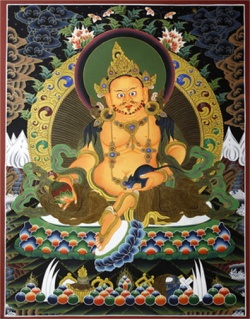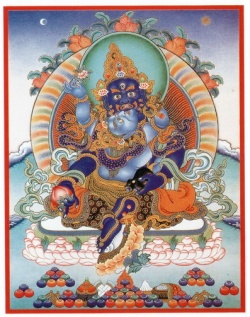Alaka
In Hinduism, Alaka (Sanskrit: अलक), which is also sometimes called Alakapuri, is a mythical city. It is the home of Kubera, the king of Yakshas and the lord of wealth, and his attendants called yakshas. The Mahabharata mentions this city as the capital of the Yaksha Kingdom. This city rivals the capital of Indra the king of the Devas in its architecture, opulence, and overall splendor. It is quoted in the famous lyrical poem Meghadūta by Kalidasa.
Lord Kubera resides in the mythological city of Alkapuri, which is said to be situated on one of the spurs of the Mount Meru in the exalted Himalayas. Incidentally, Mount Meru, which is believed to be densely forested with the divine 'Kalpavraksha' trees is said to be the abode of Lord Shiva also. Alkapuri is also known by the names of Vasudhara, Vasusathli and Prabha. As per the Hindu epics of Ramayana and Mahabharata, Lord Kubera had his sway on the city of Lanka before he was ousted from there by his half brother, the demon king Ravana. He was also the proud owner of the celestial aerial chariot 'Pushpak Viman', which was later-on snatched away from him by the demon king Ravana. The city of Lanka is believed to have been built of gold by the divine architect Vishwakarma for the residence of Lord Kubera.
Maybe it was a wealthy city in the Himalaya that existed sometime in the period between 500 BC and 1000 AD. It may have been an important stop on the trade routes between Persia, India and China. This would be why it is the home of the god of wealth. His 'attendants called yakshas' also lived there. These could have been any number of ethnic groups that occupy the Indian/Chinese border zones. yakshas are a dual-personality being, sometimes described as wood-nymphs associated with woods and forests. THe second personality is a dark one, associated with cannibalism and wilderness. This can easily be a description of one of many tribal groups or societiees in the area. The dual-personality description clearly indicates a semi-familiarity. Yakshas referring to the people that live there, yet which when encountered may be good friendly groups or aggressive scary people.
Perhaps they were not tribal, but foreign. A foreign or regional group that controlled a city where wealth was to be found.
The word alaka means 'locks of hair' so it seems evident that saddhus and other yogis were present in the area. Perhaps it was from them and their stories and preachings that other peoeple outside the area came to hear about them and spread the message about them.
Aother question we should be asking is where would it have been. Now the Himalaya is a huge stretch of land and finding it would not be easy and maybe not practical either. But, it probably was out there and may still even BE out there. Perhaps the name changed and people built new dwellings and buildings over the old ones. Perhaps it is an abandoned city somewhere in the mountains. Perhaps it is completely covered by dirt and rocks. There are various astral beings and nature spirits that exist in other dimensions. They sometimes appear to people during rituals or to those who have psychic vision to see into other dimensions. There are rituals that go on at night in certain villages, where these beings are still seen.
Alaka in Sanskrit means, 'lock of curly hair'. It is also a common name for Hindu girls. Alaka means curl or lock. But Sanskrit word Alaka literally means 'girl from eight to ten years of age'.

